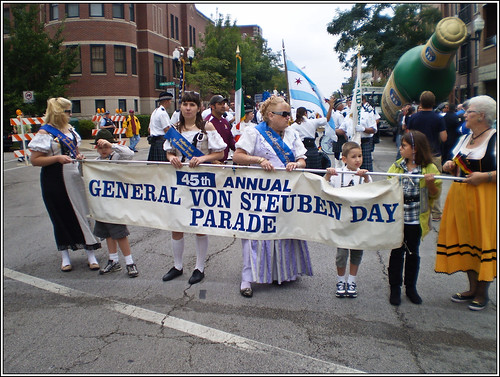German-American Day Posted by Constanze on Oct 5, 2016 in Culture, Holidays, Traditions
Guten Tag! I’m bringing you this post today in light of a special day tomorrow, October 6th 2016. Tomorrow is German-American Day in the USA! This is a day to celebrate the German heritage in America. Specifically, it commemorates the date in 1683 when 13 German families settled in Philadelphia and subsequently founded Germantown, Pennsylvania.

Map of Germantown, Pennsylvania. By OpenStreetMap, own modification – OpenStreetMap, ODbL, https://commons.wikimedia.org/w/index.php?curid=29094399
German-American Day is now a yearly celebration of the German heritage in America. It was originally celebrated in the 19th century, died out for a while during World War I (unsurprisingly due to the anti-German attitude of the time), and then was revived in 1983 to mark the 300th anniversary of German immigration to the USA.
German-American Day is now a public holiday in the USA. Various celebrations for it are organised by the German-American Heritage Foundation of the USA.
In German, it is called Deutsch-Amerikanischer Tag.
You might be surprised to hear it, but there is a rich German heritage in both north and south America. In fact, there are approx. 50 million German Americans in the United States alone.
Some other examples of German culture in the USA include:
Von Steuben Day is a celebration for German immigrant Baron Friedrich von Steuben, who came to the USA in the 18th century to offer his services to George Washington. Von Steuben Day is traditionally celebrated in September in various cities across the USA, the biggest one being the German-American Steuben Parade, held in New York City. Amongst other things, it features marching bands playing traditional German music.

People dressed in German clothing for the Von Steuben Day Parade in USA. Photo by gas_station_sushi on flickr.com under a CC license (CC BY-ND 2.0)
Pennsylvania German is a German dialect spoken in parts of the USA by people with German roots. American English has had a huge influence on it, resulting in a fascinating mix of German and English. I covered Pennsylvania German (also called Pennsylvania Dutch) on the blog here and here.
Oktoberfest, the famous Bavarian beer festival held annually in Munich, is also celebrated in several American towns with German heritage, including Fredericksburg in Texas and Frankenmuth in Michigan – a town often nicknamed ‘Little Bavaria’.
If you find this topic interesting, I’d love to cover it some more by looking in closer detail at some of the towns and cities from around the world with German heritage. 🙂
But for now, wherever you are, enjoy Deutsch-Amerikanischer Tag!

Build vocabulary, practice pronunciation, and more with Transparent Language Online. Available anytime, anywhere, on any device.
About the Author: Constanze
Servus! I'm Constanze and I live in the UK. I'm half English and half German, and have been writing about German language and culture on this blog since 2014. I am also a fitness instructor & personal trainer.




Comments:
Mehrdad:
cool
Carmel Grima:
Why yes the topic is quite interesting. On a smaller scale Octoberfest is also celebrated in Malta. A Bavarian band comes over to aid to the merriment and help the beer go down in good spirit.
Reader:
Good article. However, Germantown, PA was founded in 1683, not 1963 (we happen to live nearby and that seemed way too recent!) : )
Barry Hummel:
Please stop with the Dutch. We are not Dutch and do not speak Dutch. We speak Deutsch. May be we butcher up the language but we are not Dutch.
Joni Everhart:
@Barry Hummel Barry, work on your reading comprehension. She did not say they were Dutch. She said it’s a German dialect spoken by people with German roots. And whether you like it or not, it is called Pennsylvania Dutch, because in the 17th & 18th century the English didn’t care about saying Deutsch properly, they said Dutch, and it stuck.
Constanze:
@Barry Hummel Yes, as Joni said, ‘Dutch’ is a different way of saying ‘Deutsch’, in this instance. I didn’t say anything about the Dutch language. 🙂
M. Bernhard:
You wrote that German-American Day ” commemorates the date in 1963 when 13 German families settled in Philadelphia and subsequently founded Germantown, Pennsylvania.” Are you sure it’s 19…63?
Constanze:
@M. Bernhard Oops! Thanks for spotting that! Correcting it now. 🙂
Dan:
I believe you meant 1693, not 1963.